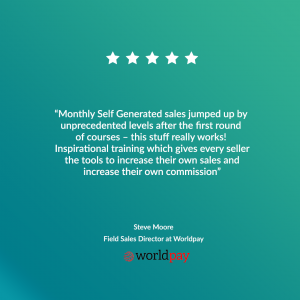Understanding the principle of social proof can help sales people influence customers to make a favourable decision. So, what is Social Proof and how can it help sales people be more effective?
Have you ever done any of these things; walked into a pub or restaurant, realised it’s empty and decided to walk out and go somewhere else; somewhere busier? Or decided to purchase a product based on the positive reviews that are associated with it, or decided not to purchase a product based on the negative reviews associated with it? In fact, can you remember at all the last time you bought something and didn’t look at the reviews before finalising your decision?
Are you ever tempted by the “Best Seller” or “Most Popular” products? When buying a product on Amazon or other online sites, can you resist being influenced by their suggestions as to what other customers also bought? These questions are largely rhetorical because I know many of you will have done some or all of these things at some point. These are examples of the principle of persuasion known as Social Proof.
In the book “Influence,” Robert Cialdini describes social proof as “the tendency to see an action as more appropriate when others are doing it.” Cialdini claims social proof is more powerful when we’re uncertain what to do. In other words, social proof is one way for us to discern what is correct through reference to what other people think is correct.
I’m going to explore two approaches, which rely on the principle of Social Proof, that can be simply and effectively utilised by sales people to great effect; referrals and testimonials.
Referrals
When a friend or family member recommends a product, you’re more likely to take their endorsement seriously. In fact, Nielsen reports that the most meaningful form of advertising is recommendations from friends and family: with 83% of consumers in 60 countries saying they trust these recommendations over any other form of advertising.
Research on social proof has shown that our peers in particular, and their choices, are important to us and influence our decisions and actions. As a general rule of thumb, we typically will choose to do the same thing that our peers are doing. So in business, when a peer makes a referral, we’re more likely to pay attention.
There are two really useful tips that can help supercharge your referral engine:
- Ask for referrals. Sales people are often either reluctant or simply forget to ask for referrals. It is great when referrals are unsolicited and come as a surprise and we become the beneficiary of someone recommending us, but our customers are busy people and we can’t rely on these unsolicited referrals alone. Feel confident in asking for a referral, you will be surprised how many people say yes.
- Secondly remember the rule of ‘give to get;’ Cialdini suggests that people feel socially obligated to repay in kind what another person has provided for us. As a minimum we should thank customers or others who recommend us. However the best sales people I’ve come across offer referrals in reciprocation. Find out what an ideal referral for your customer looks like and work hard to provide referrals where possible. I guarantee when you give to get, you will not only provide a lot more value for your customers but you will also benefit yourself.
Testimonials
The biggest difference between a testimonial and a referral lies in the individual’s relationship to the source of the testimonial or referral. A referral comes from someone we know whilst a testimonial is usually written by somebody we don’t know. Whilst we know that customers are more likely to trust recommendations from people they know, testimonials from people they don’t know are still extremely powerful in the context of social proof.
In a local consumer review survey in 2017 conducted by BrightLocal, they found that 85% of consumers trust online reviews as much as personal recommendations. The study also mentioned that consumers read an average of 7 reviews before trusting a business.
The power of testimonials lies in their objectivity. That is, someone outside of the supplier does the talking, so in theory, credibility is higher. Sales people can maximise the power of their testimonials by making them more believable. According to research by Newman et al; on increasing subjective feelings of truth, the best way is to do this is to put a face to the words. Pictures were found to increase trust among all participants. As a general rule of thumb, it is best to avoid generic testimonials or case studies that reference “a financial services customer” or similar.
In addition, prominent client logos in testimonials are highly memorable and provide additional credibility. Wherever possible, get customers permission to use their logo, this is particularly helpful if they are seen as an industry leader in some capacity. I’ve included an example of a testimonial from one of our clients below as an example.

Testimonials, or case studies, are particularly powerful when they focus on a moment where a customer describes a very specific (and very real) pain or gain that they benefited from with your product/service. This allows people to understand and empathise much more effectively with how your product/service helps other similar people or businesses.
Finally, the mechanisms of social proof work best when the proof is provided by the behaviour and actions of numerous people. It seems that the greater the number of people who find an idea to be correct, the more correct and valid the idea will be, for the observer.
In summary
The science is clear, social proof is a powerful influencing force and one which our marketing colleagues have been leveraging for some time. But rather than relying on marketeers to do the heavy lifting, sales people should capitalise on the multiple customer-facing opportunities they have to capture testimonials and referrals. Make it a regular part of all interactions with customers. Some years ago, whilst working at another well-known training company, our stated aim was to work with “case worthy clients,” this encouraged the sales team to think about the potential for a case study or testimonial right at the start of any client engagement. Those sales people that build a systemic referral and testimonial engine into their sales process will be more successful.

